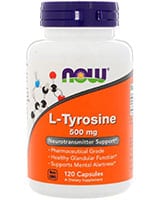

1. What is L-Tyrosine?
L-tyrosine is a non-essential amino acid, meaning the body can produce it naturally. While all amino acids serve as building blocks for proteins, L-Tyrosine is distinctively recognized as a precursor to several neurotransmitters that regulate mood, cognition, and other brain functions[1]Tomen, D. (2023). Tyrosine. Nootropics Expert. Retrieved from https://nootropicsexpert.com/tyrosine/.
Sources of L-Tyrosine
L-tyrosine is abundant in various dietary sources. It is predominantly found in high-protein foods such as cheese, meat, poultry, fish, and dairy products. The name “tyrosine” is derived from the Greek word “tyros,” which translates to cheese[2]Van De Walle, G. (2023). Tyrosine: Benefits, Side Effects, and Dosage. Healthline. Retrieved from https://www.healthline.com/nutrition/tyrosine, marking the food source where it was first identified.
2. What is N-Acetyl L-Tyrosine (NALT)?
N-acetyl L-Tyrosine, commonly referred to as NALT, is L-Tyrosine with a minor modification: the addition of an acetyl group[3]Ristic, A. (2023). N-acetyl L-tyrosine (NALT): Benefits, Side Effects, Dosage. SelfDecode. Retrieved from https://supplements.selfdecode.com/blog/n-acetyl-l-tyrosine/. This change is believed to enhance its absorption and stability, making it a popular choice for supplementation.
Comparison with L-Tyrosine
While NALT is lauded for its enhanced solubility and absorption, scientific evidence presents a nuanced picture. Some studies suggest that a significant portion of ingested NALT is excreted unchanged, without being converted into L-Tyrosine. However, other research indicates that NALT is indeed metabolized into L-Tyrosine in the body[4]Examine.com. (2023). Research Breakdown on L-Tyrosine. Retrieved from https://examine.com/supplements/l-tyrosine/research/. The comparative efficacy of NALT and L-Tyrosine remains an area of active research.
3. Benefits of L-Tyrosine and NALT
L-tyrosine and NALT, due to their roles in neurotransmitter synthesis, have been associated with a range of potential health benefits. Here’s a detailed look at these benefits:
Cognitive Enhancement
Both L-Tyrosine and NALT have been linked to improved cognitive function, especially under conditions of stress[5]Verywell Health. (2023). Here’s What You Should Know About L-Tyrosine. Retrieved from https://www.verywellhealth.com/everything-you-need-to-know-about-l-tyrosine-7567409. L-Tyrosine, in particular, has shown promise in enhancing alertness, memory, and attention in demanding situations. These benefits are attributed to its role in increasing the levels of catecholamines, which include dopamine, norepinephrine, and epinephrine. These neurotransmitters play central roles in mental health, cognition, behaviour, and stress response.
Mood Regulation
There’s evidence to suggest that L-Tyrosine may have potential antidepressant effects[6]Al-Mahmood, S., Sapuan, A., & Choudhury, H. (2016). The Antidepressant Effect of L-Tyrosine-Loaded Nanoparticles. Retrieved from https://pubmed.ncbi.nlm.nih.gov/27647959/. By serving as a precursor to neurotransmitters that regulate mood, it can influence emotional well-being. While anecdotal reports suggest similar mood-enhancing effects for NALT, rigorous scientific evidence is still pending.
Production of Thyroid Hormones
L-tyrosine plays a crucial role in the production of thyroid hormones, which are essential for regulating metabolism[7]Cleveland Clinic. (2023). L-Tyrosine Benefits and Side Effects. Retrieved from https://health.clevelandclinic.org/l-tyrosine/. An imbalance in thyroid hormones can lead to various health issues, including fatigue, weight gain, and depression.
Physical and Mental Performance
While L-Tyrosine has been explored for its potential to boost physical performance, the results are mixed. However, its role in enhancing mental performance, especially under stress, is more established[8]Deijen, J. B., & Orlebeke, J. F. (2015). Tyrosine for Mitigating Stress and Enhancing Performance in Healthy… Retrieved from https://pubmed.ncbi.nlm.nih.gov/26126245/. NALT, due to its relation to L-Tyrosine, is believed to offer similar benefits, but direct studies on NALT’s impact on physical and mental performance are limited.
4. Side Effects and Interactions
Like all supplements, L-Tyrosine and NALT come with potential side effects and interactions that users should be aware of:
Potential Adverse Effects
Some individuals might experience headaches, fatigue, or gastrointestinal discomfort after consuming L-Tyrosine or NALT[9]Ristic, A. (2023). N-acetyl L-tyrosine (NALT): Benefits, Side Effects, Dosage. SelfDecode. Retrieved from https://supplements.selfdecode.com/blog/n-acetyl-l-tyrosine/. It’s essential to start with a low dose and monitor for any adverse reactions.
Interactions with Medications
Both L-tyrosine and NALT can interact with certain medications, especially those related to thyroid function and dopamine regulation[10]Lefton, J. (2023). Everything You Need to Know About L-Tyrosine. Verywell Health. Retrieved from https://www.verywellhealth.com/everything-you-need-to-know-about-l-tyrosine-7567409. It’s crucial to consult with a healthcare professional before starting supplementation, especially if you’re on medication.
5. Dosage Recommendations
Determining the right dosage for L-Tyrosine and NALT is essential for maximizing benefits while minimizing potential side effects.
L-Tyrosine
For cognitive benefits, especially under conditions of stress or sleep deprivation, dosages ranging from 500 mg to 2 grams are commonly recommended[11]Spaeder, K. (2020). The Recommended Dosage for L-Tyrosine. Livestrong. Retrieved from https://www.livestrong.com/article/408238-the-recommended-dosage-for-l-tyrosine/. However, the optimal dosage can vary based on individual factors such as body weight, age, and overall health. It’s advisable to start with a lower dose and adjust based on individual response.
N-Acetyl L-Tyrosine (NALT)
Given that NALT is a modified form of L-Tyrosine, its dosages might differ. While there’s no universally accepted dosage for NALT, many users and practitioners recommend starting with a dose of 300-500 mg and adjusting based on individual needs and responses.
It’s essential to note that while these dosages are based on available research and common practices, individual needs can vary. Always consult with a healthcare professional before starting or adjusting any supplementation.
6. Conclusion
L-tyrosine and N-acetyl l-tyrosine (NALT) are amino acids with significant roles in neurotransmitter synthesis and various physiological processes. While both have been associated with cognitive enhancement, mood regulation, and other potential benefits, it’s crucial to approach supplementation with an informed perspective. Before starting any new supplement, especially if you have underlying medical conditions or are on medications, it’s imperative to consult with a doctor. They can provide guidance on the appropriate dosage, monitor for potential side effects, and ensure safe and effective use. Understanding the differences, potential benefits, side effects, and interactions can help users make informed decisions, but professional medical advice should always be the primary guide.
Buy L-Tyrosine and N-Acetyl L-Tyrosine (NALT) Online Review Comparison Table
| Product | Company | Quantity | Price | Country | Website |
 L-Tyrosine | iHerb | 120 pills (500mg) | $9.78 |  Worldwide, AU | Visit Website >> |
References
| ↑1 | Tomen, D. (2023). Tyrosine. Nootropics Expert. Retrieved from https://nootropicsexpert.com/tyrosine/ |
|---|---|
| ↑2 | Van De Walle, G. (2023). Tyrosine: Benefits, Side Effects, and Dosage. Healthline. Retrieved from https://www.healthline.com/nutrition/tyrosine |
| ↑3, ↑9 | Ristic, A. (2023). N-acetyl L-tyrosine (NALT): Benefits, Side Effects, Dosage. SelfDecode. Retrieved from https://supplements.selfdecode.com/blog/n-acetyl-l-tyrosine/ |
| ↑4 | Examine.com. (2023). Research Breakdown on L-Tyrosine. Retrieved from https://examine.com/supplements/l-tyrosine/research/ |
| ↑5 | Verywell Health. (2023). Here’s What You Should Know About L-Tyrosine. Retrieved from https://www.verywellhealth.com/everything-you-need-to-know-about-l-tyrosine-7567409 |
| ↑6 | Al-Mahmood, S., Sapuan, A., & Choudhury, H. (2016). The Antidepressant Effect of L-Tyrosine-Loaded Nanoparticles. Retrieved from https://pubmed.ncbi.nlm.nih.gov/27647959/ |
| ↑7 | Cleveland Clinic. (2023). L-Tyrosine Benefits and Side Effects. Retrieved from https://health.clevelandclinic.org/l-tyrosine/ |
| ↑8 | Deijen, J. B., & Orlebeke, J. F. (2015). Tyrosine for Mitigating Stress and Enhancing Performance in Healthy… Retrieved from https://pubmed.ncbi.nlm.nih.gov/26126245/ |
| ↑10 | Lefton, J. (2023). Everything You Need to Know About L-Tyrosine. Verywell Health. Retrieved from https://www.verywellhealth.com/everything-you-need-to-know-about-l-tyrosine-7567409 |
| ↑11 | Spaeder, K. (2020). The Recommended Dosage for L-Tyrosine. Livestrong. Retrieved from https://www.livestrong.com/article/408238-the-recommended-dosage-for-l-tyrosine/ |

Leave a Reply